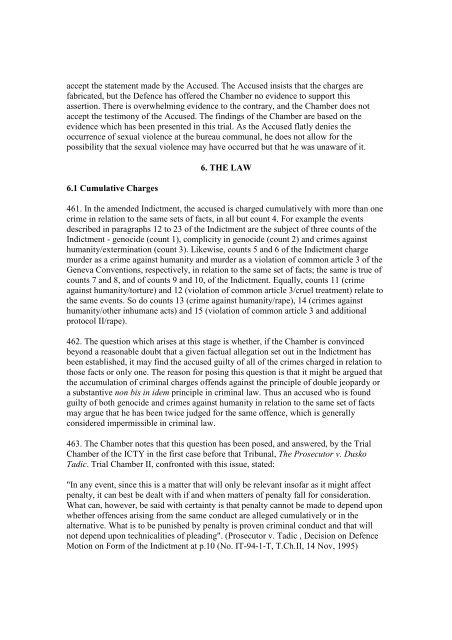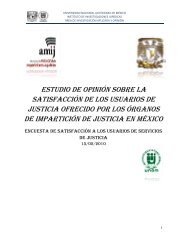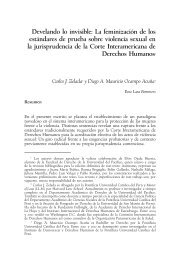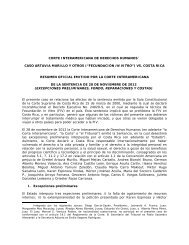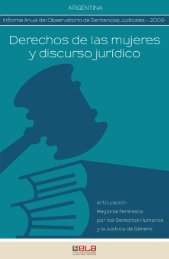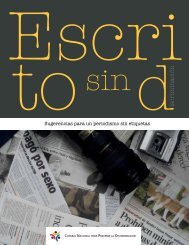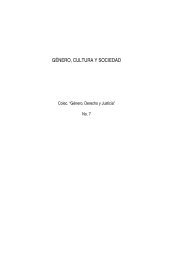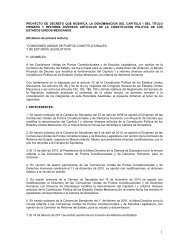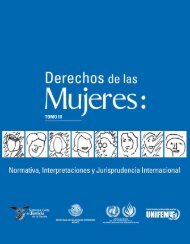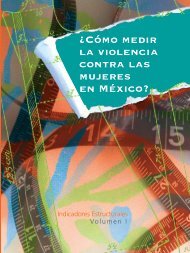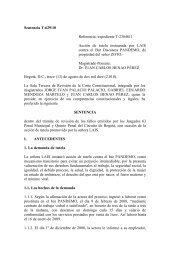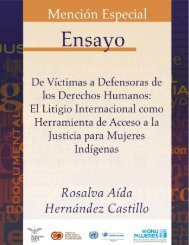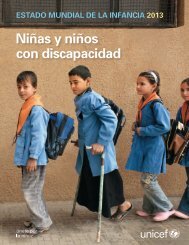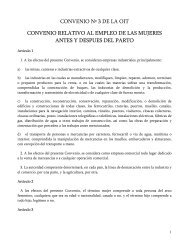Case No. ICTR-96-4-T - International Criminal Tribunal for Rwanda
Case No. ICTR-96-4-T - International Criminal Tribunal for Rwanda
Case No. ICTR-96-4-T - International Criminal Tribunal for Rwanda
- No tags were found...
You also want an ePaper? Increase the reach of your titles
YUMPU automatically turns print PDFs into web optimized ePapers that Google loves.
accept the statement made by the Accused. The Accused insists that the charges arefabricated, but the Defence has offered the Chamber no evidence to support thisassertion. There is overwhelming evidence to the contrary, and the Chamber does notaccept the testimony of the Accused. The findings of the Chamber are based on theevidence which has been presented in this trial. As the Accused flatly denies theoccurrence of sexual violence at the bureau communal, he does not allow <strong>for</strong> thepossibility that the sexual violence may have occurred but that he was unaware of it.6.1 Cumulative Charges6. THE LAW461. In the amended Indictment, the accused is charged cumulatively with more than onecrime in relation to the same sets of facts, in all but count 4. For example the eventsdescribed in paragraphs 12 to 23 of the Indictment are the subject of three counts of theIndictment - genocide (count 1), complicity in genocide (count 2) and crimes againsthumanity/extermination (count 3). Likewise, counts 5 and 6 of the Indictment chargemurder as a crime against humanity and murder as a violation of common article 3 of theGeneva Conventions, respectively, in relation to the same set of facts; the same is true ofcounts 7 and 8, and of counts 9 and 10, of the Indictment. Equally, counts 11 (crimeagainst humanity/torture) and 12 (violation of common article 3/cruel treatment) relate tothe same events. So do counts 13 (crime against humanity/rape), 14 (crimes againsthumanity/other inhumane acts) and 15 (violation of common article 3 and additionalprotocol II/rape).462. The question which arises at this stage is whether, if the Chamber is convincedbeyond a reasonable doubt that a given factual allegation set out in the Indictment hasbeen established, it may find the accused guilty of all of the crimes charged in relation tothose facts or only one. The reason <strong>for</strong> posing this question is that it might be argued thatthe accumulation of criminal charges offends against the principle of double jeopardy ora substantive non bis in idem principle in criminal law. Thus an accused who is foundguilty of both genocide and crimes against humanity in relation to the same set of factsmay argue that he has been twice judged <strong>for</strong> the same offence, which is generallyconsidered impermissible in criminal law.463. The Chamber notes that this question has been posed, and answered, by the TrialChamber of the ICTY in the first case be<strong>for</strong>e that <strong>Tribunal</strong>, The Prosecutor v. DuskoTadic. Trial Chamber II, confronted with this issue, stated:"In any event, since this is a matter that will only be relevant insofar as it might affectpenalty, it can best be dealt with if and when matters of penalty fall <strong>for</strong> consideration.What can, however, be said with certainty is that penalty cannot be made to depend uponwhether offences arising from the same conduct are alleged cumulatively or in thealternative. What is to be punished by penalty is proven criminal conduct and that willnot depend upon technicalities of pleading". (Prosecutor v. Tadic , Decision on DefenceMotion on Form of the Indictment at p.10 (<strong>No</strong>. IT-94-1-T, T.Ch.II, 14 <strong>No</strong>v, 1995)


